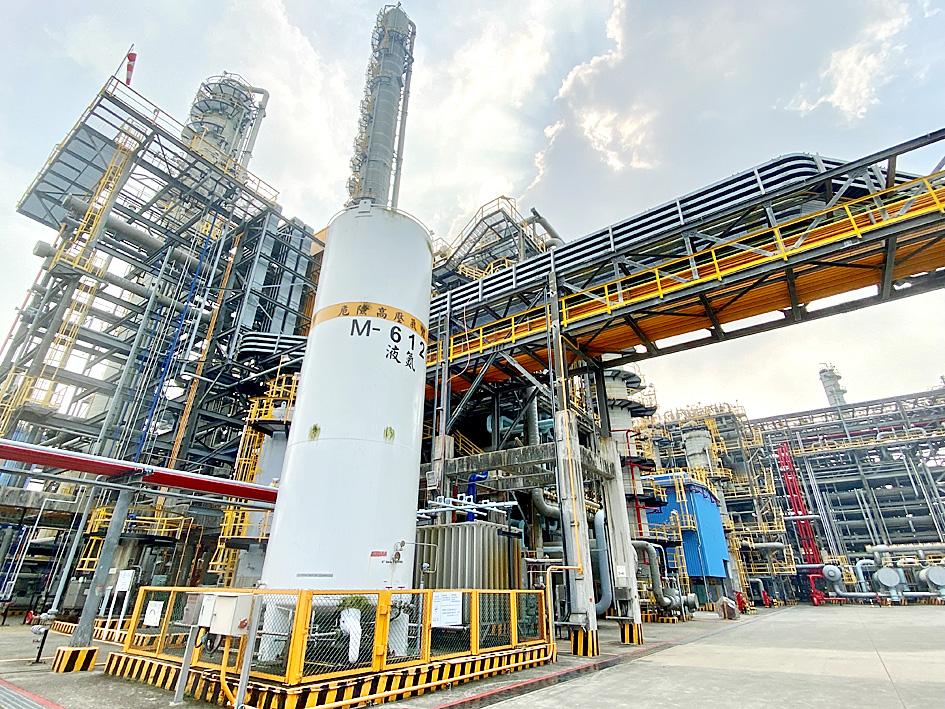As crude oil prices rise sharply this year due to the war in Ukraine, the value of Taiwan’s oil imports surged by 75.6 percent to US$11.9 billion in the first five months of this year compared with the same period last year, the Ministry of Finance said in a report on Thursday.
The import value is expected to reach from US$28 billion to NT$31 billion by the end of the year, the highest in eight years, the ministry said.
Taiwan is almost entirely dependent on imports for its oil supply, the ministry said, adding that the import volume was stable from 2012 to 2019, at above 300 million barrels a year, while the import value fluctuated with changes in international oil prices.

Photo: Hung Chen-hung, Taipei Times
Taiwan last year imported 282.88 million barrels of oil, up 6.6 percent from a year earlier, while the import value rose 59 percent to US$19.9 billion, as the reopening of major economies boosted crude oil prices, the ministry said.
That was in contrast to 2020, when the nation imported 265.26 million barrels of oil, down 18 percent from a year earlier, while the import value plunged 41.5 percent to US$12.5 billion, the lowest in 18 years, after responses to the spread of COVID-19 wreaked havoc on the global economy and severely dented oil demand and prices, the ministry said.
Oil imports this year have extended momentum from last year, as the war in Ukraine drove oil prices to more than US$100 per barrel, it said.
The nation imported 121.86 million barrels of oil in the first five months, up 10.9 percent from a year earlier, at average prices of US$97.80 per barrel, the ministry said.
Most of the nation’s oil imports came from the Middle East, with Saudi Arabia accounting for 34.5 percent and Kuwait contributing 20.1 percent in the first five months, while those from the US comprised 21.1 percent of the total during the first five months thanks to an increase in shale oil imports, it said.
Taiwan’s exports of refined petroleum products also have a high correlation with oil prices, the ministry said. In 2013, exports of such products reached US$22.9 billion, but dropped in subsequent years, with the value falling to US$5.7 billion in 2020, the lowest in 17 years, it said.
Exports of refined products last year increased 68.8 percent from a year earlier to US$9.7 billion, and increased 100.5 percent to US$6.5 billion in the first five months of this year, of which diesel exports accounted for 55 percent of the total and gasoline products comprised 20 percent, the ministry said.

Taiwan will prioritize the development of silicon photonics by taking advantage of its strength in the semiconductor industry to build another shield to protect the local economy, National Development Council (NDC) Minister Paul Liu (劉鏡清) said yesterday. Speaking at a meeting of the legislature’s Economics Committee, Liu said Taiwan already has the artificial intelligence (AI) industry as a shield, after the semiconductor industry, to safeguard the country, and is looking at new unique fields to build more economic shields. While Taiwan will further strengthen its existing shields, over the longer term, the country is determined to focus on such potential segments as

UNCERTAINTY: Innolux activated a stringent supply chain management mechanism, as it did during the COVID-19 pandemic, to ensure optimal inventory levels for customers Flat-panel display makers AUO Corp (友達) and Innolux Corp (群創) yesterday said that about 12 to 20 percent of their display business is at risk of potential US tariffs and that they would relocate production or shipment destinations to mitigate the levies’ effects. US tariffs would have a direct impact of US$200 million on AUO’s revenue, company chairman Paul Peng (彭雙浪) told reporters on the sidelines of the Touch Taiwan trade show in Taipei yesterday. That would make up about 12 percent of the company’s overall revenue. To cope with the tariff uncertainty, AUO plans to allocate its production to manufacturing facilities in

COLLABORATION: Given Taiwan’s key position in global supply chains, the US firm is discussing strategies with local partners and clients to deal with global uncertainties Advanced Micro Devices Inc (AMD) yesterday said it is meeting with local ecosystem partners, including Taiwan Semiconductor Manufacturing Co (TSMC, 台積電), to discuss strategies, including long-term manufacturing, to navigate uncertainties such as US tariffs, as Taiwan occupies an important position in global supply chains. AMD chief executive officer Lisa Su (蘇姿丰) told reporters that Taiwan is an important part of the chip designer’s ecosystem and she is discussing with partners and customers in Taiwan to forge strong collaborations on different areas during this critical period. AMD has just become the first artificial-intelligence (AI) server chip customer of TSMC to utilize its advanced

While China’s leaders use their economic and political might to fight US President Donald Trump’s trade war “to the end,” its army of social media soldiers are embarking on a more humorous campaign online. Trump’s tariff blitz has seen Washington and Beijing impose eye-watering duties on imports from the other, fanning a standoff between the economic superpowers that has sparked global recession fears and sent markets into a tailspin. Trump says his policy is a response to years of being “ripped off” by other countries and aims to bring manufacturing to the US, forcing companies to employ US workers. However, China’s online warriors